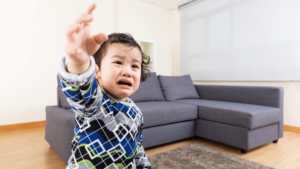Parents and teachers play a big role in the lives of children by shaping their personality and polishing their skills. Every child has some emotional needs that need to be met. However, when a child is diagnosed with a learning disability, academic success typically becomes parents’ and teachers’ primary goal. While this is equally important and promotes the child’s well-being, understanding how the learning disability affects the child’s emotions is also essential.
The emotional state of children with learning disabilities hugely depends on the support networks available for them – not all exhibit the same emotional needs. However, many find themselves struggling with self-worth because they cannot carry out simple routine tasks with ease like other children. The feeling of being less than others or not being enough demoralizes them and limits their potential. Therefore, such feelings need to be addressed. The good news is, Therapists / Psychologists can help you understand your child’s emotional needs and learn strategies to cope with their issues practically and effectively.

Signs of Emotional Issues in children with learning disabilities
To understand the relationship between learning disabilities and emotions, you need to be aware of the signs of emotional turmoil, including the following:
- Low self-esteem
- Sadness
- Moodiness
- Irritability
- Frequent headaches
- Stomach aches even when there’s no physical illness
- Acting out
- Negative behavior in general
- Anxiety issues
- Not wanting to attend school
- Apathy in some cases
Emotional needs and What to do
Once parents have familiarized themselves with the signs of emotional turmoil, they can help their child learn coping with learning disabilities and emotional strategies. Here are some common problems children having learning disabilities go through, along with practical strategies to meet their emotional needs:
Problems with self-worth
Having low self-esteem and losing a sense of self-worth is perhaps the most common issue faced by children with learning disabilities. Though it is more prevalent before diagnosis, it persists afterward as well in some cases. The good news is it has a relatively simple solution. It involves children “learning” about learning disabilities. They need to be aware of what a learning disability is. It is not necessarily a sign of low intelligence. It is often used to describe children with higher IQ levels unable to perform their best according to their abilities in a given area. Once children understand that they have an issue, not a lack of intellect, they put their strengths and weaknesses into perspective.
As parents, your attitude reflects in that of a child. Pushing your child too hard to be perfect, trying to minimize their shortcomings, and excessive worrying about their learning disability affects their self-esteem. They need you to help them know about their learning disabilities and maintain a positive self-image.
The feeling of not fitting in
Having a learning disability may result in children feeling like the “odd one out.” It can be a traumatic experience, especially for older children and preteens. Children at this age are concerned with fitting in, which requires them to be similar to their peers. Having no friends with the same issues may feel alienating. This is common in schools and educational institutes. Therefore, it is vital to communicate with the child’s teachers.
Often, teachers are unaware of a child’s learning disability. They may mistakenly embarrass the child by pointing them out in the class to answer a question. It puts your child in a vulnerable position as their issues are revealed in front of others. Both parents and teachers should work together and formulate strategies that work for the child. For example, instead of pointing out, the teacher can wait for the child to participate in the class without pointing them out.
Lack of positive attention
Children with learning disabilities have to go through a lot outside of the home. Schools can be challenging and make them feel unsafe. Some children begin to think about school as an evil place where their deficits or issues are always highlighted. Teachers must make sure to provide positive attention to such students. For example, if children with learning disabilities participate in the class, make sure that their efforts are appreciated.
Giving positive attention works wonders. It limits negative behavior patterns like acting out in front of teachers as a defense mechanism. The struggle of emotional needs through learning disabilities period is real. If these needs aren’t met, consider switching schools so that your child can get a better academic environment.
Being worn out
The academic life of a child with learning disabilities is downright exhausting. Though every school-going kid hates doing homework, having a learning disability makes things much harder. A child with such issues has to work much harder than their peers. Having learning disabilities means extra tutors, more study sessions, and hours and hours of practice. As these children progress through each grade, their work gets more demanding, and they experience burnout or exhaustion. As a result, they start resenting school and studies – rebellious behavior is commonly observed.
Parents and teachers need to set realistic and achievable goals. Try breaking down the goals into smaller milestones. Having step-by-step successes motivates the child with learning disabilities to keep trying and perform better. It is also essential to give your young one some time to relax and take a break.
In addition to the strategies mentioned above, helping your child identify, focus on, and polish their unique talents and skills is essential. It gives them a positive sense of identity and makes them stand out from the rest in a good way. Some children are naturally gifted with a beautiful voice, some are born artists, and others seem to be good at musical instruments. Make sure you help your young ones identify their strength because it fosters a healthy self-image.
Get professional help
If you seek help with learning disabilities and emotional strategies from qualified Therapists / Psychologists in Riverside, California, Los Angeles, California, Corona, California, and Orange City, California, choose MindShift Psychological Services. The highly qualified professionals at MindShift Psychological Services help you and your child with your issues by providing in-depth therapy sessions. The step by step approach used in Individual Therapy, Group Therapy, and Cognitive Behavioral Therapy (CBT) helps you practically manage your issues. You can also get in touch with qualified professionals through Teletherapy and start the healing process while sitting in the comfort of your own home.




